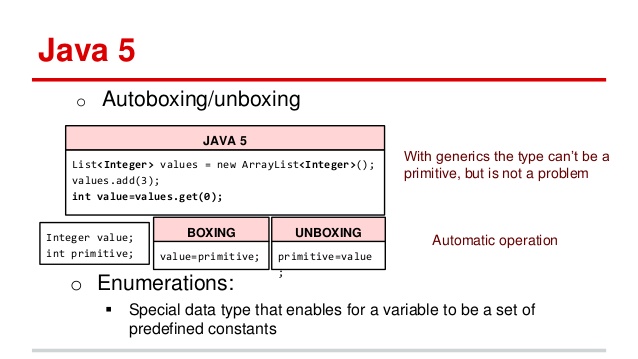import java.util.*;
class Person implements Comparable<Person> {
private static int count = 0; // static (class) field
protected String name; // instance field
protected int age; // instance field
public Person() {
//System.out.println("Person Constructor"); // this("", 0); error: call to this must be first statemenht in constructor
this("", 0);
}
public Person(String name, int age) {
count++;
this.name = name;
this.age = age;
}
public Person(Person other) {
this(other.name, other.age);
}
public String getName() {
return name;
}
public int getAge() {
return age;
}
public void setName(String name) {
this.name = name;
}
public void setAge(int age) {
this.age = age;
}
public void set(String name, int age) {
this.name = name;
this.age = age;
}
public void set(Person other) {
this.name = other.name;
this.age = other.age;
}
public Person clone() {
Person p = new Person(this.name, this.age);
return p;
}
@Override
public boolean equals(Object other) { // Object.equals overriding
if (other instanceof Person) {
Person that = (Person) other;
return that.canEqual(this) && this.getName().equals(that.getName()) && this.getAge() == that.getAge();
}
return false;
}
@Override
public int hashCode() {
return (41 * getName().hashCode() + getAge());
}
public boolean canEqual(Object other) {
return (other instanceof Person);
}
@Override
public String toString() { // Object.toString() overriding
return "Person Name: " + name + " Age: " + age;
}
public void print() { // instance methods
System.out.println("Person Name: " + name + " Age: " + age);
}
public static void printCount() { // static (class) methods
System.out.println("Person Count: " + count);
}
public static int getCount() { // static (class) methods
return count;
}
public static void setCount(int value) { // static (class) methods
count = value;
}
public int compareTo(Person other) {
String thisName = this.getName().toUpperCase();
String otherName = ((Person)other).getName().toUpperCase();
//ascending order
return thisName.compareTo(otherName);
//descending order
//return otherName.compareTo(thisName);
}
public static Comparator<Person> AgeComparator = new Comparator<Person>() {
public int compare(Person p1, Person p2) {
int age1 = p1.getAge();
int age2 = p2.getAge();
//ascending order
return age1 – age2;
//descending order
//return age2 – age1;
}
};
}
///////////////////////////////////////////////////////////////////////////////////////
class Student extends Person {
private static int count = 0; // static (class) field
protected int id;
public Student() {
id = 5208;
}
public Student(String name, int age, int id) {
super(name, age);
this.id = id;
count++;
}
public int getID() {
return id;
}
public void setID(int id) {
this.id = id;
}
public void set(String name, int age, int id) {
super.set(name, age);
this.id = id;
}
public void set(String name, int age) {
super.set(name, age);
}
public void set(Student other) {
this.set(other.name, other.age, other.id);
}
public void set(Person other) {
if (other instanceof Person)
super.set(other);
else
this.set((Student)other);
}
public Student clone() {
Student s = new Student(this.name, this.age, this.id);
return s;
}
@Override
public boolean equals(Object other) { // Object.equals overriding
if (other instanceof Student) {
Student that = (Student) other;
return that.canEqual(this) && this.getName().equals(that.getName()) && this.getAge() == that.getAge() && this.getID() == that.getID();
}
return false;
}
@Override
public int hashCode() {
return (41 * super.hashCode() + getID());
}
public boolean canEqual(Object other) {
return (other instanceof Student);
}
@Override
public String toString() { // Object.toString() overriding
return "Student Name: " + name + " Age: " + age + " ID: " + id;
}
public void superPrint() {
super.print();
}
public void print() { // Person.print() method overriding
System.out.println("Student Name: " + name + " Age: " + age + " ID: " + id);
}
public static void printCount() { // static (class) methods
System.out.println("Student Count: " + count);
}
public static int getCount() { // static (class) methods
return count;
}
public static void setCount(int value) { // static (class) methods
count = value;
}
public int compareTo(Student other) {
String thisName = this.getName().toUpperCase();
String otherName = ((Student)other).getName().toUpperCase();
//ascending order
return thisName.compareTo(otherName);
//descending order
//return otherName.compareTo(thisName);
}
public static Comparator<Student> AgeComparator = new Comparator<Student>() {
public int compare(Student p1, Student p2) {
int age1 = p1.getAge();
int age2 = p2.getAge();
//ascending order
return age1 – age2;
//descending order
//return age2 – age1;
}
};
public static Comparator<Student> IDComparator = new Comparator<Student>() {
public int compare(Student p1, Student p2) {
int id1 = p1.getID();
int id2 = p2.getID();
//ascending order
return id1 – id2;
//descending order
//return id2 – id1;
}
};
}
class PersonStudentTest {
public static void print(Object[] array) {
for(Object o : array) {
System.out.println(o);
}
}
public static void main(String[] args) {
///////////////////////////////////////////////////////////////////////
Student[] sList = new Student[3];
sList[0] = new Student("Kevin", 0, 222);
sList[1] = new Student("Jason", 1, 333);
sList[2] = new Student("John", 2, 111);
System.out.println("STUDENT SORT BY NAME (DEFAULT)!!!");
Arrays.sort(sList);
print(sList);
System.out.println("STUDENT SORT by AGE!!!");
Arrays.sort(sList, Student.AgeComparator);
print(sList);
System.out.println("STUDENT SORT by ID!!!");
Arrays.sort(sList, Student.IDComparator);
print(sList);
///////////////////////////////////////////////////////////////////////
Student[] sList2 = new Student[3];
sList2[0] = new Student("Kevin", 0, 222);
sList2[1] = new Student("Jason", 1, 333);
sList2[2] = new Student("John", 2, 111);
System.out.println("STUDENT SORT BY NAME (anonymous method)!!!");
Arrays.sort(sList2, new Comparator<Student>() {
public int compare(Student s1, Student s2) {
return s1.getName().toUpperCase().compareTo(s2.getName().toUpperCase());
}
});
print(sList2);
System.out.println("STUDENT SORT by AGE (anonymous method)!!!");
Arrays.sort(sList2, new Comparator<Student>() {
public int compare(Student s1, Student s2) {
return s1.getAge() – s2.getAge();
}
});
print(sList2);
System.out.println("STUDENT SORT by ID (anonymous method)!!!");
Arrays.sort(sList2, new Comparator<Student>() {
public int compare(Student s1, Student s2) {
return s1.getID() – s2.getID();
}
});
print(sList2);
///////////////////////////////////////////////////////////////////////
Student[] sList3 = sList2;
System.out.println("STUDENT SORT BY NAME (lambda)!!!");
Arrays.sort(sList3, (Student ss1, Student ss2) ->
ss1.getName().compareTo(ss2.getName())
);
Arrays.stream(sList3).forEach((s) -> System.out.println(s));
System.out.println("STUDENT SORT by AGE (lambda)!!!");
Arrays.sort(sList3, (Student ss1, Student ss2) ->
Integer.compare(ss1.getAge(), ss2.getAge())
);
Arrays.stream(sList3).forEach((s) -> System.out.println(s));
System.out.println("STUDENT SORT by ID (lambda)!!!");
Arrays.sort(sList3, (Student ss1, Student ss2) ->
Integer.compare(ss1.getID(), ss2.getID())
);
Arrays.stream(sList3).forEach((s) -> System.out.println(s));
///////////////////////////////////////////////////////////////////////
List<Student> sList4 = new ArrayList<Student>();
sList4.add(new Student("Kevin", 0, 222));
sList4.add(new Student("Jason", 1, 333));
sList4.add(new Student("John", 2, 111));
System.out.println("STUDENTLIST SORT BY NAME (lambda)!!!");
sList4.sort((Student ss1, Student ss2) ->
ss1.getName().compareTo(ss2.getName())
);
sList4.forEach((s) -> System.out.println(s));
System.out.println("STUDENTLIST SORT by AGE (lambda)!!!");
sList4.sort((Student ss1, Student ss2) ->
ss1.getAge() – ss2.getAge()
);
sList4.forEach((s) -> System.out.println(s));
System.out.println("STUDENTLIST SORT by ID (lambda)!!!");
sList4.sort((Student ss1, Student ss2) ->
ss1.getID() – ss2.getID()
);
sList4.forEach((s) -> System.out.println(s));
}
}

